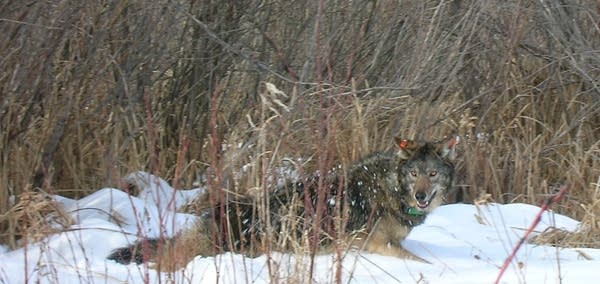Conservation groups challenge wolf hunt in court
Go Deeper.
Create an account or log in to save stories.
Like this?
Thanks for liking this story! We have added it to a list of your favorite stories.

Two groups are challenging Minnesota's planned wolf hunt in court, saying the Department of Natural Resources did not make sufficient effort to seek public input when it designed the season. Wolves were removed from the Endangered Species List early this year, and the legislature directed the DNR to proceed with a hunting and trapping season.
State agencies, including the DNR, are bound to follow specific laws when they do something as serious as setting up a hunting season. The Center for Biological Diversity and Howling for Wolves contend the DNR did not follow the rules when it laid out its plan for Minnesota's first regulated wolf hunting and trapping season.
Specifically, the groups say the DNR failed to provide an opportunity for public comment.
In early May, the legislature and governor authorized the DNR to set rules for a season, and specified that the start of the season should coincide with the opening of firearms season for deer. It was not specified what year the hunt should start.
Turn Up Your Support
MPR News helps you turn down the noise and build shared understanding. Turn up your support for this public resource and keep trusted journalism accessible to all.
Later in the spring, the DNR announced it would develop plans for a season this fall, and given the short time frame, would only take public comment through an online survey.
That survey was inadequate, says the lawyer for the Center for Biological Diversity, Collete Adkins Giese.
"Minnesota law requires formal notice and comment rulemaking, where the public should be able to submit comments in writing to the agency, and have their opinions fully considered," Giese said.

Republican Bill Ingebrigtsen of Alexandria, who chairs the state Senate Committee on Environment and Natural Resources, said the DNR did do enough to get public input. It was clear during hearings in his committee that the agency planned to go ahead with the hunt, he said.
"Some would say that's putting the cart before the horse, but nevertheless the opportunity for public testimony came during my committee, and I think it was adequate testimony there, both for and against," Ingebrigtsen said. "It was very clear that with the numbers, being the third-largest group of wolves in the North American continent, that we have the obligation to manage those animals just like we do everything else that's overpopulated."
But the conservation groups say there's another consideration separate from their lawsuit. It's not a good idea to rush into a hunting season immediately after the animals lose their federal protection, Giese said.
"Wolves under state management are being killed for depredation control by livestock owners that experience losses from wolves," Giese said. "Already there's additional killing now that wasn't happening when they were federally protected, and it makes good sense to wait some time, monitor the wolves under state management, before opening a recreational hunting and trapping season."
The state's wolf plan, developed back in 2001 in anticipation of the animal's removal from the Endangered Species List, called for a five-year moratorium on hunting or trapping. But that was before a series of lawsuits pushed back the delisting year after year. Now there is disagreement about whether biologists know enough about how Minnesota's wolf packs function.
Most experts say the population is very robust, capable of rebounding even if hunters and trappers were to kill many more than the quota of 400 wolves set by the DNR.
The agency has considered potential changes resulting from Minnesota's more permissive rules, DNR spokesman Chris Niskanen said.
"We built a lot of conservative approach to the season into the hunting and trapping season, so we've taken that into account," Niskanen said. "And we're very comfortable that these seasons won't have any biological or conservation impact on wolves."
The two conservation groups are asking the court for an injunction to halt the hunt while it considers their arguments. Opening day is scheduled Nov. 3.
Dear reader,
Political debates with family or friends can get heated. But what if there was a way to handle them better?
You can learn how to have civil political conversations with our new e-book!
Download our free e-book, Talking Sense: Have Hard Political Conversations, Better, and learn how to talk without the tension.





